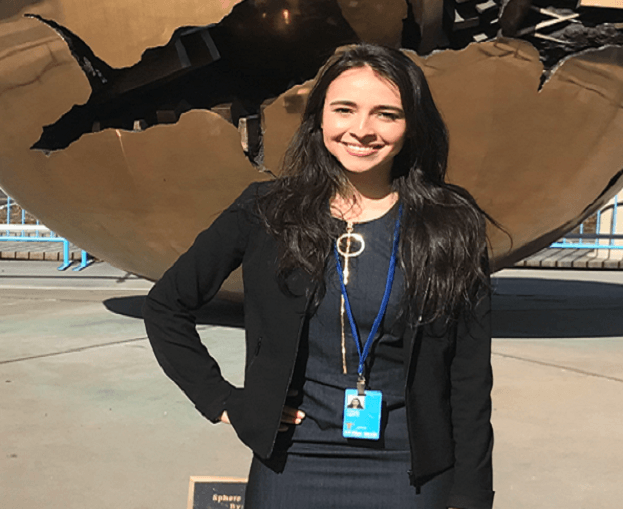
Pace University student Angelica Roman ’19 at UN headquarters in New York City.
The following reflection is from Angelica Roman ’19, a Pace University undergraduate who participated in the POL297L Global Politics of Disarmament and Arms Control class in Fall 2018. Students were given with service learning assignments with disarmament advocacy organizations working in and around the UN General Assembly First Committee (International Security and Disarmament). For more on the class, click here.
I walked through the doors of the United Nations on September 27, 2018, clenching my grounds pass, anxiously walking through the halls, feeling the nerves creep through every vein of my body. “I don’t deserve to be here,” my thoughts piercingly echoed in my head.
“Why was an inexperienced philosophy undergraduate student attending First Committee?”, I asked myself. In a room full of expert Delegates and activists I felt like the pariah. I was the young adult who knew very little about nuclear weapons, missiles, drones, or really any topic at First Committee.
Yet I was guaranteed a seat for two weeks. I was allowed to hear, take notes, and ask questions to the leaders of the world. I realized that this opportunity I had was one of a kind. And while other college students read and studied the reports of First Committee that week, I was able to physically be present in the room with all of the delegates.
When I first started my week at the United Nations, I knew I was embarking a journey that would leave me knowledge and stories to tell for years. But little did I know that my presence would in some way impact the United Nations as well. Truthfully, I was not ready for the adventures that First Committee brings. But then again, who really is?
As a student in the Global Politics of Disarmament and Arms Control course I decided to be a part of a project on drones because it was a topic that I knew nothing about. Sadly, after my two weeks at the United Nations I realized that my expectations for learning more about Drones in the context of the United Nations was unfulfilled.
Out of six events I attended, only one event mentioned UAVs. I learned more about Drones from a brochure distributed by a NGO called PAX than I did from attending events. Even when Drones were mentioned in an event I attended, it was discussed very briefly. I felt disappointed that there was so little discussion of drones.
However, after much contemplation, I believe that the lack of mention of drones was a lesson in itself. Drones are a fairly new topic within the United Nations. In fact, one of the major issues I understood from the brochure distributed by PAX was that States need to clarify their position over the growing use of armed drones.
States’ positions are in flux and in order to achieve real progress within the scope of the United Nations States need to be more transparent regarding their positions and concerns over drone operations. Before progress can be made on international policies on Drones, or really any military weapon, at least some states have to clearly express their positions. This taught me an important lesson about international politics, disarmament policy processes and advocacy.
My duty in the United Nations was to listen for any information being said regarding drones and UAVs and to record them on a document. I was one of many note takers that week wildly trying to document every word stated by every delegate.
Documenting statements was sometimes a difficult task. It was very overwhelming to accurately document what each speaker had to say, especially when there was a translator speaking on their behalf. Also, some speakers showed a lack of enthusiasm and sped through their entire statement, so I would be left with very little to report.
Wading through the diplomatic jargon and disputes in First Committee, what stood out to me the most was the lack of political representation. I noticed that certain countries and groups of people had been completely neglected from decision making processes. This was a result of certain countries not being recognized as an individual nation state.
I noticed this lack of representation from my representative at the United Nations. I come from a Puerto Rican heritage and I found that Puerto Rico was completely neglected in all aspects. I believe that their neglect exemplifies a greater issue at the United Nations. Women, children, persons with disabilities and indigenous people also face this lack of attention. The decisions made at the United Nations are failing to reflect a universal standard. This needs to be resolved.
My experiences at the United Nations inspired me to write my thesis on this topic. In doing so, I feel I am doing an act of advocacy and impacting the diplomatic sphere. Anyone can make a step towards bettering the world, they just need to have the confidence to try. I feel that my experience during First Committee helped me grow and understand that, although I may not be an expert regarding the issues that are discussed, I and so many other deserve to be a part of the decisions made there.

February 18, 2019 at 7:21 pm
This blog speaks volumes! Excellent work Angelica!
February 27, 2019 at 1:14 am
Thank you!